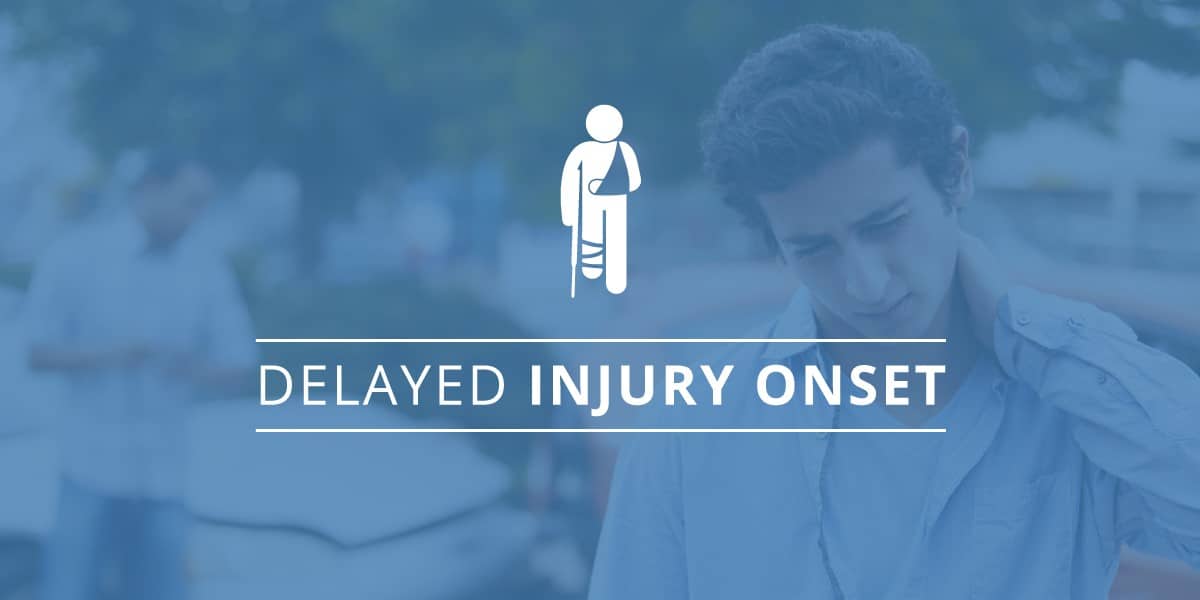
There are a range of injuries that may occur in a Fort Worth car accident. Some of these, such as broken bones and lacerations, are immediately apparent. Others, however, may take a few days or even longer to manifest symptoms.
For this reason, if you have been involved in a motor vehicle accident, you should seek medical attention right away—even if you do not think you have been injured.
Why Do Some Injuries Take Longer to Show Up?
In the moments following a motor vehicle accident, accident victims usually experience a surge of adrenaline. Adrenaline may actually mask the symptoms of a fresh car accident injury. This is because adrenaline is produced during the body’s “fight or flight” response. To allow us to escape from a dangerous situation, adrenaline temporarily reduces the body’s ability to feel pain.
Once the adrenaline wears off, the accident victim may realize he or she has been injured. At that point, if medical attention was declined, it can cause issues in the accident victim’s legal claim.
Insurance adjusters may argue that if the victim were truly injured, medical attention would have been sought immediately.
Common Injuries with Delayed Symptoms
After a car accident, it is not uncommon for some injuries to have delayed symptoms. This can occur for several reasons, including the release of endorphins and adrenaline in the body immediately following the accident. This effect can mask the pain of injuries—at least temporarily. That’s why it is essential to seek medical attention as soon as possible, even if you feel fine. Some of the injuries that could involve delayed symptoms include:
- Concussion. Concussions are the most common type of traumatic brain injury. They often occur in conjunction with whiplash, as the quick back-and-forth movement can cause the brain to be pushed against the skull. This force can injure blood vessels, connective tissues, and nerves in the brain. In addition, these injuries can worsen over time, making it likely that some symptoms are delayed.
- Whiplash. You might have suffered from whiplash if you experienced a quick back-and-forth motion that hyperextended your neck in a car accident. This is the most common auto accident injury, but its symptoms may not appear for days, weeks, or even longer after the accident. Some signs of whiplash include persistent neck or back pain, headaches, dizziness, vision problems, numbness, weakness, or immobility in the arms or legs.
- Internal bleeding. The seat belt is designed to protect you in a car accident, but the force of being thrown against it can still cause internal injuries. The seat belt can deliver blunt force to sensitive organs such as the kidneys, lungs, and heart, potentially cracking ribs or injuring other tissues. While the seat belt may have saved your life, it is important to be aware of the potential for internal injuries.
If left unaddressed, these car accident injuries may not be addressed in any claims or lawsuits that result from the auto collision. To help you avoid these circumstances, here are a few tips from our car accident attorneys.
What Are Examples of Delayed Symptoms from Car Accident Injuries?
In the immediate aftermath of a motor vehicle collision, it is very common for people not to realize the extent of their injuries. People regularly describe how they initially felt okay but woke up the next morning in extreme pain. Unfortunately, there are some injuries that simply take time to present themselves. Whiplash is a common example of this. Initially, a person might not experience any symptoms and decide not to see a doctor. But, in the days after the crash they start experiencing pain and stiffness that they think will go away on its own. Just because whiplash symptoms are delayed does not mean they are minor and will go away. Only a physician can determine that.
Common symptoms of delayed injuries include:
- Fatigue
- Chronic headaches
- Abdominal pain
- Back, neck, or shoulder pain
- Muscle stiffness
- Trouble sleeping or waking up
- Blurred vision, dizziness, or nausea
- Memory problems or memory loss
- Numbness in the hands or feet
- Sensitivity to light or loud noises
- Changes in behavior or personality
Traumatic brain injuries like concussions are also not always immediately apparent and can occur even without direct trauma to the head. Many people don’t realize they are suffering from a brain injury until they try to return to their normal routine of work or school. Only then do they notice they are experiencing cognitive processing delays, sensitivity to light or electronic screens, or headaches.
It is crucial to seek medical care as soon as symptoms arise to minimize the impact of the injury and to accurately document symptoms. It’s better to be safe than sorry so don’t assume things will get better with time. Instead, seek immediate medical care..
Traumatic brain injuries occur someone experiences a blow to the head. In some cases, the skull is penetrated. Traumatic brain injuries are common in motor vehicle accidents due to the amount of force involved in these crashes. Although many accident victims make a full recovery after sustaining a traumatic brain injury, some suffer permanent, debilitating disabilities.
Signs of traumatic brain injury may include:
- Nausea and vomiting
- Dizziness
- Lack of coordination
- Speech problems
- Vision problems
- Confusion
- Headache
- Having difficulty swallowing
- Losing consciousness
- Lethargy
- Mood changes
The signs of traumatic brain injury may be very subtle. A delay in seeking treatment may lead to poorer outcomes for those with traumatic brain injuries. Therefore, obtaining medical attention as soon as possible after an accident is essential.
Although traumatic brain injuries may not exhibit any external symptoms right away, evidence of these injuries may be detected with imaging and other tests.
Soft tissue injuries may also take an extended period of time to develop. Soft tissue injuries refer to those that impact the tendons, ligaments, and muscles.
One of the most common accident-related soft tissue injuries is whiplash. When the head is suddenly thrown forward and back, as is common in many collisions, the neck muscles may be damaged. Whiplash soreness may not show up for a day or two.
The Importance of Seeking Medical Attention Immediately
Many of us are hesitant to seek medical attention if we do not believe we are seriously injured. However, after a motor vehicle accident, it is best to seek medical attention from first responders or from a nearby medical facility. Medical providers are able to identify injuries and begin treatment for them before they become worse.
In addition, insurance companies may try to argue that an accident victim is not as seriously injured as he or she claims if the victim did not seek medical attention right away. To avoid issues in a Dallas motor vehicle accident claim, obtaining medical treatment as soon as possible is best.
Settling Too Soon May Cost You Thousands of Dollars
Not long after you are involved in a Dallas car accident, insurance adjusters begin to call. They may make you a settlement offer within days of your crash.
However, if you accept this offer—and signs of a serious injury show up afterward—you will not receive any additional compensation. Settling a claim before your injuries have been fully evaluated may leave you responsible for thousands of dollars in medical expenses.
Call Today to Speak with an Experienced Fort Worth Accident Attorney
At Patterson Law Group, our attorneys are experienced in all types of accident claims. We ensure that any settlement offers fully compensate you for your losses, and, if your case must go to court, we are not afraid to fight the insurance companies. To schedule a free consultation with our firm, call (817) 784-2000 or contact us online.





